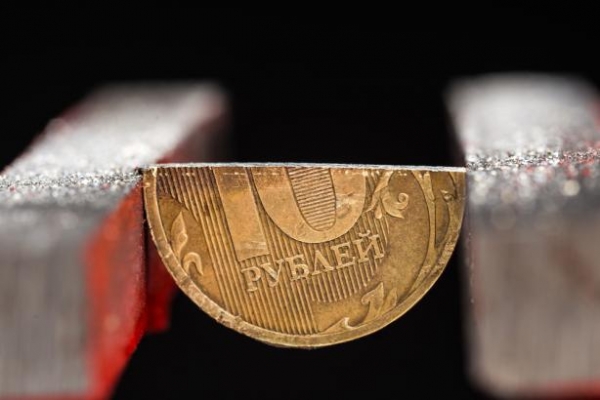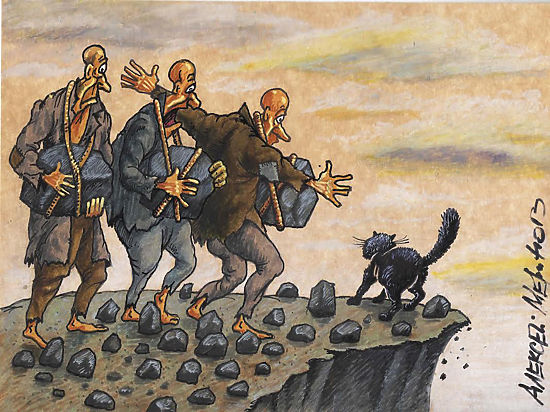
Economic Council, about the upcoming meeting of which ten days have already send all the media, took place, and?.. And nothing. That is, nothing at all. There was an exchange of views, which, in my opinion, even to a normal brainstorming (although it called it the President’s press Secretary) were not up.
Show all… on the one hand, President Putin never had any intentions urgently to change anything in the economic policy (after all, one election at first on the nose, and then the second). On the other – set participants did not abandon the hope that one of them decides to “blow up the situation” and to start to discuss the diagnosis, what is the main obstacle for economic growth” (quote from Alexei Kudrin). And how can you develop the recipes, do not put the correct diagnosis?
The participants of the meeting of the economic Council or in the positions (Ministers, ombudsmen, heads of state corporations), or tame the power (once liberal) economists that oily bird in the hand is clearly nicer mythical pie in the sky – pre-laid out their proposals on the table. And perhaps even coordinated between them, so that common elements were, on which to build the proposed compromise, and disagreements, but those that are not of an implacable nature and the critical questions no one (foolishly) started to discuss. Don’t believe? Look!
First, all the participants agreed that since the beginning of reforms can wait a few more years until the presidential elections (although what to expect is unclear – the result of those elections, any today may announce). I have respect for the participants of the Kremlin debate, in the sense that I know them all well enough now to know that a lack of “intelligence and ingenuity”, they do not suffer. So, can not understand that for every month of delay with the launch of reforms will have to pay in full today – a drop in the standard of living, degradation of public morality, departure from the country of hundreds of thousands of energetic, educated, rich. Tomorrow, for this delay will have to pay extra effort in competition with the ten countries, which will surpass Russia until it will have to wait for the sea weather.
Second, none of the meeting participants talked about the need for a speedy end to the policy of confrontation with the West (the Stolypin club, however, florid wrote: “you have to restart relations with the West”), about the necessity of lifting the sanctions, why you need to stop supporting militias in the East of Ukraine, to withdraw Russian vacationers with taken from the px heavy weapons and to give the Donbass under the control of Kiev. Can’t compromise on principles? Its not pass? Then let’s speak honestly about what is primary for the Kremlin is a game of geopolitics, in which the economy and the future of the country is not something to be sacrificed, but will be discussed “by a residual principle”. Let’s just say that in such a situation, a steady 4% growth of the economy is impossible because it is impossible to achieve on the existing technological base. It cannot be achieved through import substitution without the release of new products with high added value in foreign markets – neither are impossible without the involvement of Western capital (technology, management, human capital).
Third: the Council is certainly economic, but the fate of the economy is in the hands of politicians. Their interests depend on their decisions, their decisions depend on what will happen in the country. Freedom, as cast in granite, is better than no freedom; the modern economy and modern technology, tend to develop faster and better in free countries. So if Russia wants to escape from “middle income trap”, about the inevitability of contact in which the same Vladimir Mau speaks for a couple of years, she was required to go on political reform. Political reform is impossible without political competition. And it inevitably leads to a probable loss of power by those who holds power today. Therefore, the question of what is more important for the Kremlin – the retention of power or economic growth, it is necessary to articulate and achieve a clear answer. If the answer is one that we all assume, then, again, economic problems will be solved as a residual, that is, the choice of options will be narrowed down even more.
No one of the participants does not insist on the transfer of financial authority to the local government level, which is impossible without a sharp reduction in military spending (it seems that Alexei Kudrin is well learned in the autumn of 2011 a lesson!). All the participants speak about the need to reduce state involvement in the economy, but nobody says how to do it. Frankly, the track record of Vladimir Putin quite clearly suggests that this topic in conversation with him, better not to raise. In a word, unpleasant questions at this meeting has not sounded, and therefore, to say that the diagnosis and to discuss treatment options, it is a bit early.
Two issues – pension reform and the permissibility of using the money emission to Finance the investment projects – course, at the Kremlin meeting, voiced and discussed. And this is understandable: one has to do with the material interests of a huge layer of Russian voters that constitute the core of Putin’s electorate. The second attracted attention of experts, who saw in him the possibility of radical macroeconomic shocks. It is not known as there was a discussion on these issues, and if it was voiced higher position for him, therefore, limit myself to a brief statement of his point of view.
CSR experts and Ministry of economic development United front in favor of raising the retirement age, arguing that it is a prerequisite for economic growth. (The Stolypin club, the topic was not raised, I think, due to the fact that entrepreneurs don’t want to think about what does not concern them directly.) Have not heard detailed argument, but to me this logic seems questionable. If we talk about the “extra” workforce, many retirees today, and so continue to work after retirement. Hope that the rest will be a source of compensation of the deficit of labor resources, naively, if we are talking about building a new economy based not on the tube, but on knowledge. That is, in these sentences we are talking about reducing public liabilities and the decrease in the pressure of the pension system on the Federal budget. Thus, solved the short-term goal, however, neither CSR nor the MAYOR not tell us the main thing – how will be arranged by the new pension system for those who are now 25-30. And if today is not to answer this question, tomorrow (3-5 or 7 years) again you will need to do something again and calling it “pension reform”. When history repeats itself twice, the first time is tragedy and the second farce. Interestingly, when pension reform is carried out five times in fifteen years, could be called like this?
As for the question of monetary creation as the source of financing of the investment projects, I don’t see much difference in the approaches of the three groups. They all say that it is valid, the difference in scale. The Stolypin club is 1.5 trillion rubles a year, the MAYOR – 500 billion (at least, these sounded last year, when the government discussed the refinancing of investment projects with cheap loans from the Bank of Russia; then we agreed on 50 billion rubles, but Ms. Nabiullina said, if you choose the limit, we can and increase). Alexei Kudrin said that “government stimulus of the economy should not exceed 100-200 billion roubles”. I think that in this matter the parties it will be easy to find a compromise acceptable to all. Including the Bank of Russia, which are also not opposed to direct its emission flows to the budget – last year, in addition to the refinancing of investment projects, the Bank of Russia, funded the military mortgage, support non-oil exports and highlighted the DIA more than 800 billion rubles as nearly free of credit that are part of the evil practice of rehabilitation of bankrupt banks were transferred to the Ministry of Finance through the purchase of OFZ. In my opinion, the parties to the dialogue should not break a lance on this issue, and it is better to sit down and corny to negotiate, to whom and how much.
The President’s decision following the meeting was predictable: thank you for all the above, common ground was found, the differences specified, go look for “the sources of economic growth”, and strongly reminded me of the decision that the President of the USSR Mikhail Gorbachev announced in September 1990 after a series of discussions of the program “500 days” and the government program Nikolai Ryzhkov. Then the order issued by academician Aganbegyan, quickly renamed the Commission “to cross a hedgehog and a snake”. What came out of it, it is well known – a year later, the Soviet economy actually collapsed. And with it collapsed and the state.
Of course, today the economic situation in Russia is not as bad as a quarter of a century ago. And market-oriented economy in which due to the freedom of prices and of the ruble she constantly restores balance, provides it with a high degree of stability to many shocks (see how fast the economy has adapted to low oil prices and has lost half of its value against the ruble). However, if over sixteen years of stay in power the Russian President are unable to report that the only long-term and sustainable source of growth is a business activity, it seems to me that before the Economic Council faces a difficult task – to find something else that does not exist in nature.
What do you think will happen?








